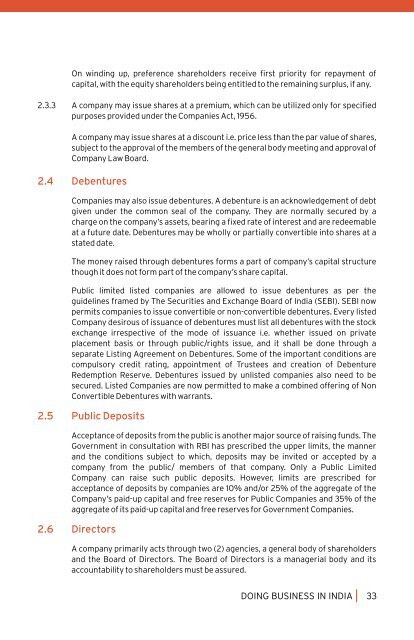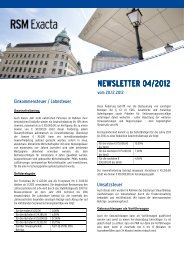Doing Business in India - RSM Austria
Doing Business in India - RSM Austria
Doing Business in India - RSM Austria
You also want an ePaper? Increase the reach of your titles
YUMPU automatically turns print PDFs into web optimized ePapers that Google loves.
On w<strong>in</strong>d<strong>in</strong>g up, preference shareholders receive first priority for repayment of<br />
capital, with the equity shareholders be<strong>in</strong>g entitled to the rema<strong>in</strong><strong>in</strong>g surplus, if any.<br />
2.3.3 A company may issue shares at a premium, which can be utilized only for specified<br />
purposes provided under the Companies Act, 1956.<br />
A company may issue shares at a discount i.e. price less than the par value of shares,<br />
subject to the approval of the members of the general body meet<strong>in</strong>g and approval of<br />
Company Law Board.<br />
2.4 Debentures<br />
Companies may also issue debentures. A debenture is an acknowledgement of debt<br />
given under the common seal of the company. They are normally secured by a<br />
charge on the company’s assets, bear<strong>in</strong>g a fixed rate of <strong>in</strong>terest and are redeemable<br />
at a future date. Debentures may be wholly or partially convertible <strong>in</strong>to shares at a<br />
stated date.<br />
The money raised through debentures forms a part of company’s capital structure<br />
though it does not form part of the company’s share capital.<br />
Public limited listed companies are allowed to issue debentures as per the<br />
guidel<strong>in</strong>es framed by The Securities and Exchange Board of <strong>India</strong> (SEBI). SEBI now<br />
permits companies to issue convertible or non-convertible debentures. Every listed<br />
Company desirous of issuance of debentures must list all debentures with the stock<br />
exchange irrespective of the mode of issuance i.e. whether issued on private<br />
placement basis or through public/rights issue, and it shall be done through a<br />
separate List<strong>in</strong>g Agreement on Debentures. Some of the important conditions are<br />
compulsory credit rat<strong>in</strong>g, appo<strong>in</strong>tment of Trustees and creation of Debenture<br />
Redemption Reserve. Debentures issued by unlisted companies also need to be<br />
secured. Listed Companies are now permitted to make a comb<strong>in</strong>ed offer<strong>in</strong>g of Non<br />
Convertible Debentures with warrants.<br />
2.5 Public Deposits<br />
Acceptance of deposits from the public is another major source of rais<strong>in</strong>g funds. The<br />
Government <strong>in</strong> consultation with RBI has prescribed the upper limits, the manner<br />
and the conditions subject to which, deposits may be <strong>in</strong>vited or accepted by a<br />
company from the public/ members of that company. Only a Public Limited<br />
Company can raise such public deposits. However, limits are prescribed for<br />
acceptance of deposits by companies are 10% and/or 25% of the aggregate of the<br />
Company’s paid-up capital and free reserves for Public Companies and 35% of the<br />
aggregate of its paid-up capital and free reserves for Government Companies.<br />
2.6 Directors<br />
A company primarily acts through two (2) agencies, a general body of shareholders<br />
and the Board of Directors. The Board of Directors is a managerial body and its<br />
accountability to shareholders must be assured.<br />
DOING BUSINESS IN INDIA 33














